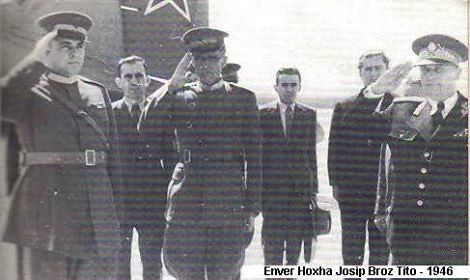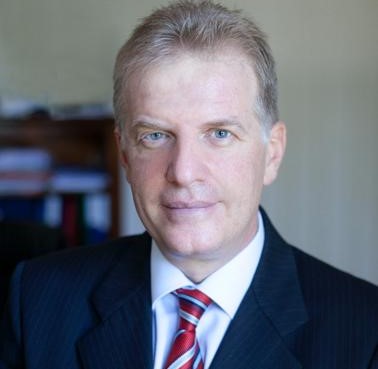Veton Suroi
Tito and Enver Hoxha, in different ways and with some delays (in the case of Albania) committed themselves to Russia not entering their countries, or to their countries not committing to Russia’s interests. This cannot be said as a conclusion for the politics of Serbia today and presents the primary dilemma: whenever the Ukraine-Russia ceasefire line is drawn, will the Western Balkans be a unique security zone?
1. It happens ritualistically and often in Serbian journalism, especially in the opposition, that Serbia, namely its leader, Aleksandar Vučić, is compared, and sometimes even equated with Enver Hoxha. In interpreting these comparisons, Serbia is trying to maintain a balance between East and West like Tito. Moreover, part of this balance is maintaining ties with Third World countries that were the axis of the Non-Aligned Movement, one of whose founders was Tito. And, in the comparative interpretation, Serbia is connecting with China, as Enver Hoxha did in his time.
The subtext of these interpretations is that Serbia is wasting time, that it should be oriented towards the West, namely the EU and NATO. The argument says that if Titoja and Enver Hoxha had done this in time, for example when the Soviet Union entered Czechoslovakia in 1968, their countries would be in a better condition, they would already be part of the transatlantic world.
But just as there is no story with “if it had happened in this form, the result would have been this”, so there is no comparative description without prior context. Yes, it is true that Serbia has similarities with Tito and Enver Hoxha in terms of the indeterminacy of the western identity of the state (and this is part of the ideology of “specialism” which it has been building since the time of Milosevic). But, no, Serbia does not have the capacity, does not have the intention and will not establish or lead the movement of the undocumented between the East and the West. And no, Serbia does not intend to connect with China as its only strategic partner in an ideological war against the whole world.
2. What is the truth, Serbia’s movements have initially received something from Tito, that of the balance between the superpowers. But the difference is essential: since 1948, Tito was expelled from the Soviet camp (communist parties around Moscow, the Warsaw Pact) and turned to the West for help in weapons and financial support as a means of survival. He told the East that he continues to be a communist, he told the West that he is a communist, but of a special species that does not take orders from Moscow. He told the Europeans the obvious, that he was European. He told the third world what was obvious, that it was the Third World.
While Yugoslavia returned to the West because it was expelled from the East, Serbia was not expelled from the West. In fact, the NATO countries have long expressed their desire for close cooperation with Serbia, and the EU has opened membership negotiations. So, Serbia’s turn towards the East was made for completely opposite reasons; in the interpretation of Serbia, the turn towards the East is not made because the West does not want Serbia, but because it has to prove this, that is, it has to show that it loves Serbia within the EU so much that it can prove this with financial support decisions, political and anything else for quick membership in it. When Kosovo enters this equation, things go towards a further vicious cycle. Because, as long as Kosovo is the biggest and objective obstacle for European Serbia, an obstacle that this Serbia, like the previous one, has no intention of solving through the normalization of mutual relations, Serbia’s connection with the East is a signal from the West that it must to do even more for it so that it does not lean more towards the East.
This game of balance, where the West must prove how much it loves Serbia within itself, has so far worked. And, in contrast to Tito’s time, where the West only needed to prove how much it does not want Yugoslavia to pass into the Soviet camp, now the stakes have been raised for it by another level, it must prove how much Serbia really wants to pass to the West, to enter the EU.
Serbia has been helped by geopolitics to raise the bar, namely its careful reading. The Cold War rules that helped Tito maintain balance no longer apply; Tito went and after him the Cold War. After a period of accommodation with the fall of the Berlin Wall, we are now in a recomposition of international relations. The relations that will emerge, among others, from the end of the war in Ukraine, the recomposition of the Middle East with a new role for Saudi Arabia, the position of Iran and the general balance between the US and China, will determine the nature of the friction between the transatlantic world and the Eurasian one. Serbia is watching this geostrategic theater, not that of Tito and Enver Hoxha.
3.The process of geopolitical change has not yet shown the contours of new relations. And, although this process has not ended, it is clear that the comparison of the current Serbia with Enver Hoxha is completely out of place and rather a negative association for the figure of Vučić. While Enver Hoxha connected with China to escape from the Soviet Union (and the West), Serbia is connecting with China as the second strongest economy in the world and transforming itself into a competitive market of technology, finance, international trade and, eventually , a Eurasian world that starts somewhere on the front line between Ukrainian and Russian forces on Ukrainian territory and ends in Vladivostok, China.
This world can easily include India and South Africa in economic policies and North Korea and Iran in security policy and any eventual candidate who believes in this world order that is built on the rule that there are no old rules. Enver Hoxha connected with isolated China to isolate Albania as much as possible within China. Serbia is connecting with China as a world power to integrate it even more into what tomorrow will be the Euro-Asian world, BRICS or the Global South, but without changing its address of residence on the European continent.
In a distant analogy, the geopolitical reading of President Vučić may be similar to that of Tito. So to tell the West that Serbia has defined the European path, to Russia that it has an independent and neutral policy that does not prevent a close relationship with it, to China that it seeks strategic partnership in finance, investment, trade, artificial intelligence; Tell the third world that Serbia also feels part of that global South.
This reading has so far worked. Serbia has tested the seriousness of the EU and NATO towards the Western Balkans since Croatia joined, i.e. since 2013. It has proven that there is greater progress towards the European Union when the European Union is more interested in having Serbia inside than Serbia itself. As in football club transfers, finding a job or selling a company, it often happens that you get more results when you ask than when you offer yourself.
4.Tito and Enver Hoxha did not see the end of their geopolitical positions because the context changed after their death.
The current state of transition towards the contours of a global realignment may test today’s Serbia whenever the moment of realization arrives that the war in Ukraine has no military winner and that a new line of cease-fire, temporary peace, or whatever it is called, will be established. between the Ukrainian and Russian forces and on the basis of an Agreement. At that point, the line of temporality (slightly longer) can be drawn between the transatlantic and Euro-Asian worlds in that part of the globe.
Several scenarios can be presented for Europe, Serbia and its neighbors. In the desired European policy, the expected scenario is that moment when Europe takes the historical responsibility, “zeitenwende”, of the great return and creates an area of freedom, security and belonging within the EU in a record period that starts from the geopolitical priority before everything else. other.
For Serbia’s desired policy, the moment when maintaining “independence and neutrality” in the policy against Russia is the moment of exclaiming “did we tell you” that Russia cannot be defeated by war; the pressure for the unification of the European foreign policy against Russia will be forgotten.
However, in real-politics, two negative scenarios can be presented for Europe, Serbia and its neighbors.
The first would be if the dividing line between the Atlanticist and Eurasian worlds passed through the territory of the Serbian people with an important part of the population believing in the Eurasian world; all the daily media ideologies about the special connection between Serbia and Russia has already turned into a collective belief for a part of the population.
The second scenario would be that this dividing line is replicated all over the Western Balkans, with the most undesirable possible scenario, among others, on the border line between Kosovo and Serbia.
Tito and Enver Hoxha, in different ways and with some delay (in the case of Albania) committed themselves to Russia not entering their countries, or to their countries not committing to Russia’s interests. This cannot be said as a conclusion for the politics of today’s Serbia and presents the primary dilemma: whenever the Ukraine-Russia ceasefire line is drawn, will the Western Balkans be a unique security zone?










